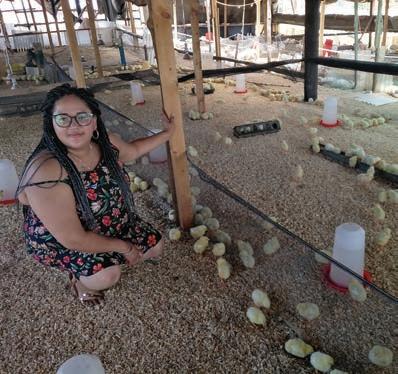
3 minute read
AGRICULTURE
GIVING FARMERS A HEAD START
Mentorship and funding programmes are crucial for new farmers. Tsholo Selolo and Joandra Cloete share their journey in poultry farming with LEVI LETSOKO

Deciding to walk away from a comfortable job to pursue poultry farming is not easy. Feeding the population is a calling with opportunities, but not without a fair share of obstacles. Founder of Polokwane-based TNJ Chickens Tsholo Selolo resigned from her job in 2016 to pursue her entrepreneurial instincts. She started a cleaning company that later failed, but she didn’t give up. While exploring other possibilities, she spotted an opportunity to provide a primary service to her community. “I saw an opportunity in poultry farming. There was no one selling eggs or chickens in my area. People travelled far to purchase live chickens and eggs,” says Selolo. In 2016, Joandra Cloete started a farming project that later grew into a company called Our
Poultry Place. Through this project, she realised her goal of being a poultry farmer in her own right, while also training and creating opportunities for other emerging farmers in Mfuleni in the
Western Cape. Similar to entrepreneurs in other sectors, Cloete and Selolo had to overcome numerous obstacles to push their farming businesses to the levels they have reached thus far. “In the beginning, my biggest challenge was acquiring the agricultural land to get the project started. I applied for land from the municipality in 2018, but my application was declined,” says Cloete. “I am currently leasing a piece of farmland from another farmer. This year, I have again applied to lease land from the government,” she adds. For farmers to start and grow their businesses, they need 360-degree support programmes that can help them to tackle Tsholo industry-related problems, as well as business support to handle Selolo the economics of running a farming enterprise. Knowing where to fi nd important information is also crucial. Understanding which agricultural practices to adopt to produce the best offering can set emerging farmers on a growth trajectory that can be sustained over the long-term. To stimulate consistent cash fl ow for her business, Selolo diversifi ed her farming product offering, but it was too early. This became a major challenge as she could not focus on one product. Diversifi cation is a positive step if taken strategically at the appropriate time. Selolo believes that now is the perfect time to do so. “We started crop farming mealies and raw nuts. We have begun preparing the soil for more produce as we intend to scale into farming vegetables,” she says.

Joandra Cloete
A HELPING HAND
Selolo and Cloete were both adopted by Fetola Business Growth Professionals. The organisation focuses on mentoring and linking new small businesses (in various sectors, including farming) to funding and paving their paths into profi table markets.
Through their relationship with Fetola, the two farmers have reached some of their milestones far quicker than they had projected. It is the goal of every farmer to outgrow subsistence farming and scale into a supplier for a broader market. Mentorship and business support programmes like Fetola make this possible.
“I received fi nancial support and was placed in a business mentorship programme with Fetola. The organisation doesn’t just fund small enterprises, but was also there to assist my business to reach greater heights and grow into a bigger business,” says Selolo.
“I was taught to leave my comfort zone as well as being pushed to work harder,” she adds.
Cloete also received intense training through the programme. She says it gave her business enough exposure and equipped her to remain competitive in her sector. “Fetola trained me to become compliant in terms of business management and production planning,” she explains.
“The programme awakened me to the importance of implementing all aspects of a new business, from administration to fi nding ways of improving the end-product supplied to consumers,” she concludes.






